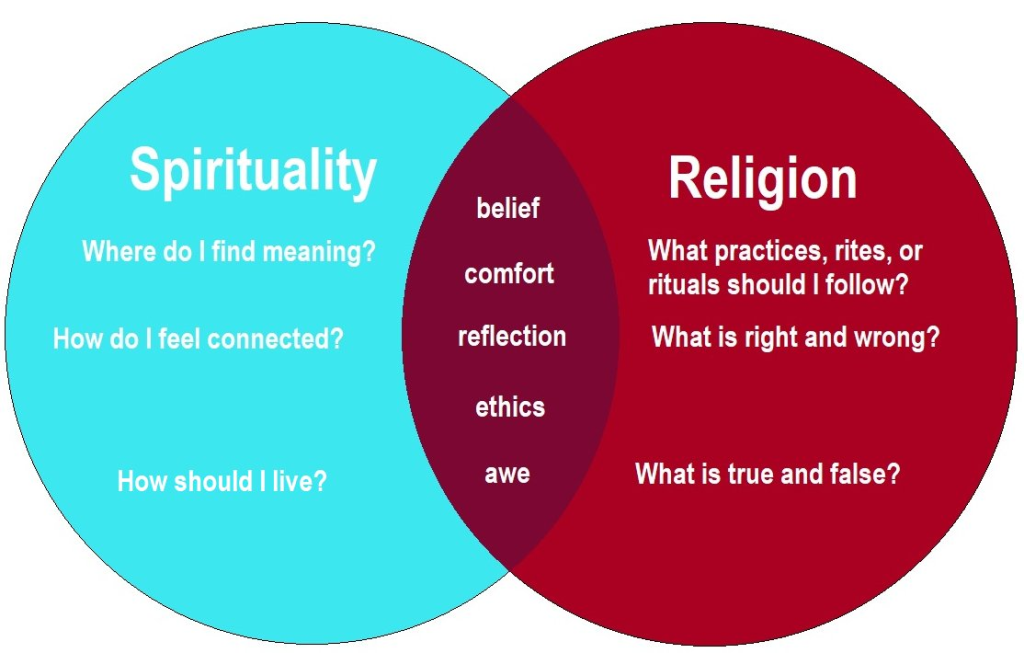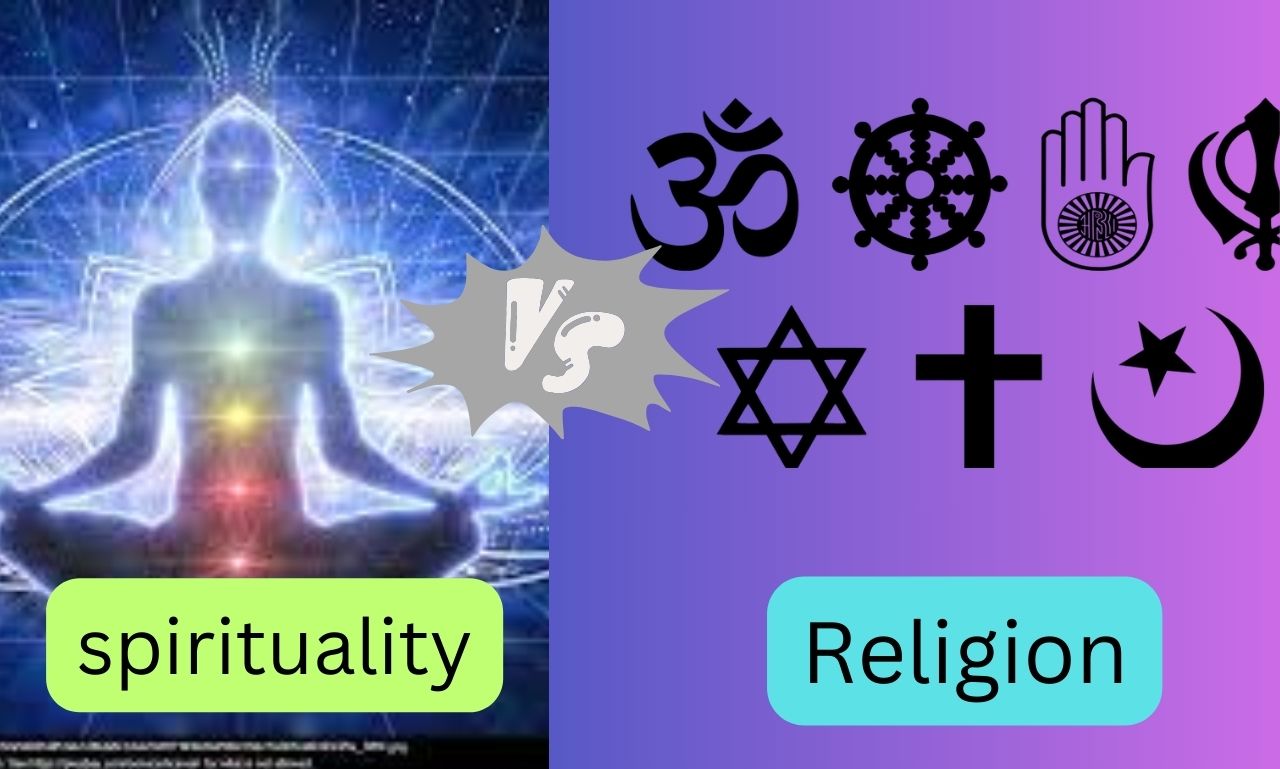Today, we’re diving into a topic that often sparks intriguing debates: the differences between spirituality and religion.
It’s a subject that’s as deep as the Mariana Trench, and I’m here to be your guide on this enlightening journey.
What’s the fundamental difference between spirituality and religion?
Check this also: best countries to travel for spiritual journey.
Spirituality is a personal and often flexible journey of self-discovery and connection with the divine or inner self. It’s not bound by rigid structures or doctrines.
Religion, on the other hand, is organized and adheres to specific beliefs, practices, and often has established hierarchies.
Spirituality vs. Religion- Comparison Table

let’s break it down into a concise comparison table to summarize the key differences between Spirituality and Religion:
| Aspect | Spirituality | Religion |
|---|---|---|
| Nature | Personal, introspective | Organized, structured |
| Flexibility | Fluid, adaptable | Rigid, adherence to doctrines |
| Inclusivity | Welcoming of diverse beliefs | May exclude those not aligned |
| Hierarchy | No formal hierarchy | Often has religious leaders |
| Objective | Inner peace, self-awareness | Salvation, spiritual rewards |
| Questioning | Encourages questioning | Values faith and discourages doubt |
| Belief System | Open to various beliefs | Follows specific tenets and doctrine |
| Focus | Quest for self, personal growth | Quest for community, shared faith |
Spirituality vs Religion- 20 Differences
Let’s start with the big question:
Are spirituality and religion interchangeable?
The short answer is no, they are not.
However, understanding the differences can be a bit like trying to distinguish between your two favorite flavors of ice cream.
They’re different but oh-so-tempting!
1. Spirituality is Personal; Religion is Organized
Spirituality is a deeply personal journey. It’s like a solo expedition into the realms of the unknown.
It’s about connecting with your inner self, exploring the mysteries of existence, and seeking purpose beyond the material world.
There are no rules set in stone, no dogma to follow – it’s all about your own beliefs, values, and experiences.
Religion, on the other hand, is more like joining a club.
It’s structured, organized, and often guided by a set of specific beliefs, practices, and rituals.
Religions have institutions, leaders, and established doctrines that lay down the law.
You’re part of a larger community with shared beliefs and customs.
2. Spirituality is Fluid; Religion is Rigid
Spirituality allows you to flow like water.
You can blend different beliefs, adopt practices from various traditions, and customize your journey as you see fit.
It’s all about adaptability and personal growth.
Your spiritual path can evolve as you do.
Religion, on the other hand, is often characterized by rigidity.
There are doctrines, commandments, and traditions to adhere to.
Straying from the prescribed path can sometimes lead to disapproval or even excommunication.
3. Spirituality Embraces All; Religion May Exclude Some
Spirituality is inclusive by nature. It doesn’t discriminate based on your background, ethnicity, or beliefs.
It’s open to everyone who seeks a deeper connection with the universe or their inner self.
Religion, unfortunately, has a history of exclusion.
Some religious institutions have set criteria for membership, making it difficult for those who don’t meet their standards to be a part of their community.
4. Spirituality Has No Hierarchy; Religion Often Does
In the realm of spirituality, there are no spiritual CEOs or divine presidents.
Everyone is equal, and wisdom is gained through experience and self-discovery.
It’s like a buffet – you pick what resonates with you.
Religions, on the other hand, often have a hierarchical structure.
There are priests, pastors, rabbis, imams, and various religious leaders. They are seen as intermediaries between the divine and the believers.
5. Spirituality is Irreligious; Religion is Holy
A widespread myth is that spirituality is synonymous with being irreligious. This couldn’t be further from the truth.
Spirituality can coexist with religious beliefs, and many religious individuals incorporate spiritual practices into their lives.
It’s not an either/or situation.
Religion is often viewed as inherently holy, but it’s essential to remember that the term “holy” is subjective.
What’s sacred to one person may not be so for another.
Both spirituality and religion can involve the pursuit of the divine or transcendent.
6. Spirituality is All About Meditation; Religion is About Prayer
While meditation is a prevalent spiritual practice, it’s not the be-all and end-all of spirituality.
Spirituality encompasses a wide range of practices, from meditation and mindfulness to yoga, connecting with nature, and exploring different forms of mysticism.
Religion, too, has its fair share of meditation and contemplation practices. It’s not just about prayer. Many religions incorporate meditation as a means to connect with the divine and attain deeper spiritual insights.
7. Spirituality is for the ‘Nones’; Religion is for the Devout
The idea that spirituality is for those who identify as “Nones” (having no religious affiliation) and that religion is solely for the devout is a stereotype.
In reality, many individuals who identify as religious also have a spiritual side. They might seek a more personal connection with their faith alongside their religious community.
Conversely, there are spiritual individuals who do not identify with any religion. They prefer a more individualized approach to their spiritual journey.
8. Spirituality is Free from Dogma; Religion is Dogmatic
Here’s the scoop: spirituality isn’t entirely free from dogma either.
While it may lack the formal dogma of established religions, individuals can develop their own set of beliefs, which can be just as unwavering and dogmatic as religious doctrine.
On the flip side, religion can be open to interpretation and flexible in practice.
Many religious traditions have evolved over time, and different denominations or sects within a religion might interpret their dogma differently.
9. Spirituality Seeks Inner Peace; Religion Strives for Salvation
Spirituality often focuses on finding inner peace, self-awareness, and personal growth.
It’s about creating a harmonious relationship with oneself, others, and the world.
There’s no overarching goal of salvation in the afterlife; it’s about experiencing a fulfilling life here and now.
Religion, on the other hand, frequently centers on salvation, whether that means achieving a place in heaven, moksha, or another form of spiritual reward.
It’s rooted in a particular faith’s beliefs and practices that lead to salvation.
10. Spirituality Encourages Questioning; Religion Values Faith
In the realm of spirituality, questioning and seeking answers is not only allowed but often encouraged.
It’s about a personal journey of exploration and discovery. Doubt and introspection are part of the process.
Religion, on the other hand, places a high value on faith.
It often discourages questioning or doubting established beliefs and encourages adherents to have unwavering faith in the teachings and doctrines of their faith.
11. Spirituality is Inclusive of All Beliefs; Religion Adheres to Specific Tenets
Spirituality is like a big tent that welcomes people from various belief systems.
It doesn’t require you to adhere to specific tenets or doctrines.
It’s about finding your own path within the vast landscape of spiritual beliefs.
Religion, conversely, follows specific tenets and doctrines particular to that faith.
These beliefs are the foundation of the religion and are expected to be followed by its members.
12. Spirituality is a Quest for Self; Religion is a Quest for Community
Spirituality often involves a personal quest to discover oneself, one’s purpose, and a sense of inner peace.
It can be a solitary journey or one shared with like-minded individuals, but the primary focus is on the self.
Religion, in contrast, is centered around a sense of community. It brings people together through shared beliefs, rituals, and traditions.
It’s not just about personal salvation but also about participating in a larger religious community.
13. Spirituality is Transcendent; Religion is Immanent
Spirituality often seeks the transcendent – a connection with something greater than oneself, beyond the confines of the material world. It’s about reaching for the divine, the cosmic, or the mystical.
Religion, in contrast, can be more immanent, focusing on the divine presence within the world and daily life.
Many religious practices involve rituals and traditions meant to bring the sacred into the ordinary.
14. Spirituality Values Experience; Religion Values Tradition
In the realm of spirituality, personal experience and direct encounters with the divine or transcendent are highly valued.
It’s about your unique journey and the insights gained from your encounters.
Religion, on the other hand, places significant importance on tradition and the collective experience of a faith community.
It’s rooted in rituals and practices passed down through generations, creating a sense of continuity and belonging.
15. Spirituality is Eclectic; Religion is Canonical
Spirituality is often eclectic, drawing from various traditions, philosophies, and practices.
It’s like a spiritual buffet where you can choose what resonates with you.
Religion, by contrast, follows a canonical set of teachings and scriptures specific to that faith.
Deviation from these established texts and beliefs may not be well-received.
16. Spirituality is a Personal Journey; Religion is a Communal Journey
Spirituality is deeply personal and often pursued individually.
It’s a journey of self-discovery, growth, and finding one’s unique path to enlightenment.
Religion, however, is a communal journey.
It’s about coming together with others who share the same faith, worshiping as a community, and following the traditions of that religious group.
17. Spirituality is About Connection; Religion is About Conformity
Spirituality is all about forging a personal connection – with the cosmos, with a higher power, or with your inner self.
It celebrates individuality and authenticity.
Religion, conversely, often emphasizes conformity, with followers expected to adhere to the same rituals, beliefs, and practices as their religious community.
It’s about unity and adherence to a collective identity.
18. Spirituality is Inward; Religion is Outward
The focus of spirituality is often inward, delving deep into the recesses of one’s mind and soul.
It seeks to explore the inner self, find inner peace, and attain a deeper understanding of the self.
Religion, on the other hand, tends to direct its attention outward. It’s about worship, community, and engagement with the external world through religious rituals and practices.
19. Spirituality is Dynamic; Religion is Steady
Spirituality is like a flowing river, always evolving and adapting to the individual’s needs and experiences.
It’s a dynamic journey that accommodates personal growth.
Religion, on the other hand, often remains relatively steady over time.
It’s rooted in tradition, and while it may undergo changes, these changes tend to be slow and deliberative.
20. Spirituality is Inclusive; Religion Can Be Exclusive
Spirituality generally embraces inclusivity, welcoming all seekers regardless of their background, beliefs, or personal experiences. It’s about unity and connection with humanity.
Religion can sometimes be exclusive, with certain faith communities limiting membership based on strict criteria, and often emphasizing that their beliefs are the “right” ones.
FAQs- Spirituality vs Religion
2. Can you be both spiritual and religious?
Certainly! Many people blend aspects of both spirituality and religion into their lives.
They may have a religious affiliation while incorporating personal spiritual practices or beliefs.
3. Do you have to choose between spirituality and religion?
No, you don’t have to choose one over the other. It’s a matter of what resonates with you personally.
Many people find a balance that suits their spiritual needs by drawing from both.
4. Can atheists or agnostics be spiritual?
Absolutely! Spirituality isn’t inherently tied to a belief in a higher power or deity.
It can involve a sense of wonder, connection with the universe, or simply a quest for deeper self-understanding.
5. Is it possible to change from a religious path to a spiritual one, or vice versa?
Yes, many individuals transition between these paths at different stages of their lives.
People might start in a religious tradition and then move towards a more personal, spiritual path, or vice versa, depending on their evolving beliefs and experiences.
6. How can I explore my spirituality or religion further?
Exploration can include reading spiritual texts, attending religious services or spiritual workshops, practicing meditation, or seeking guidance from mentors and experts in your chosen path.
7. Can spirituality and religion coexist peacefully?
Absolutely. Many individuals find harmony in their lives by embracing both spiritual and religious aspects.
It’s all about finding the right balance that aligns with your beliefs and values.
Source:




